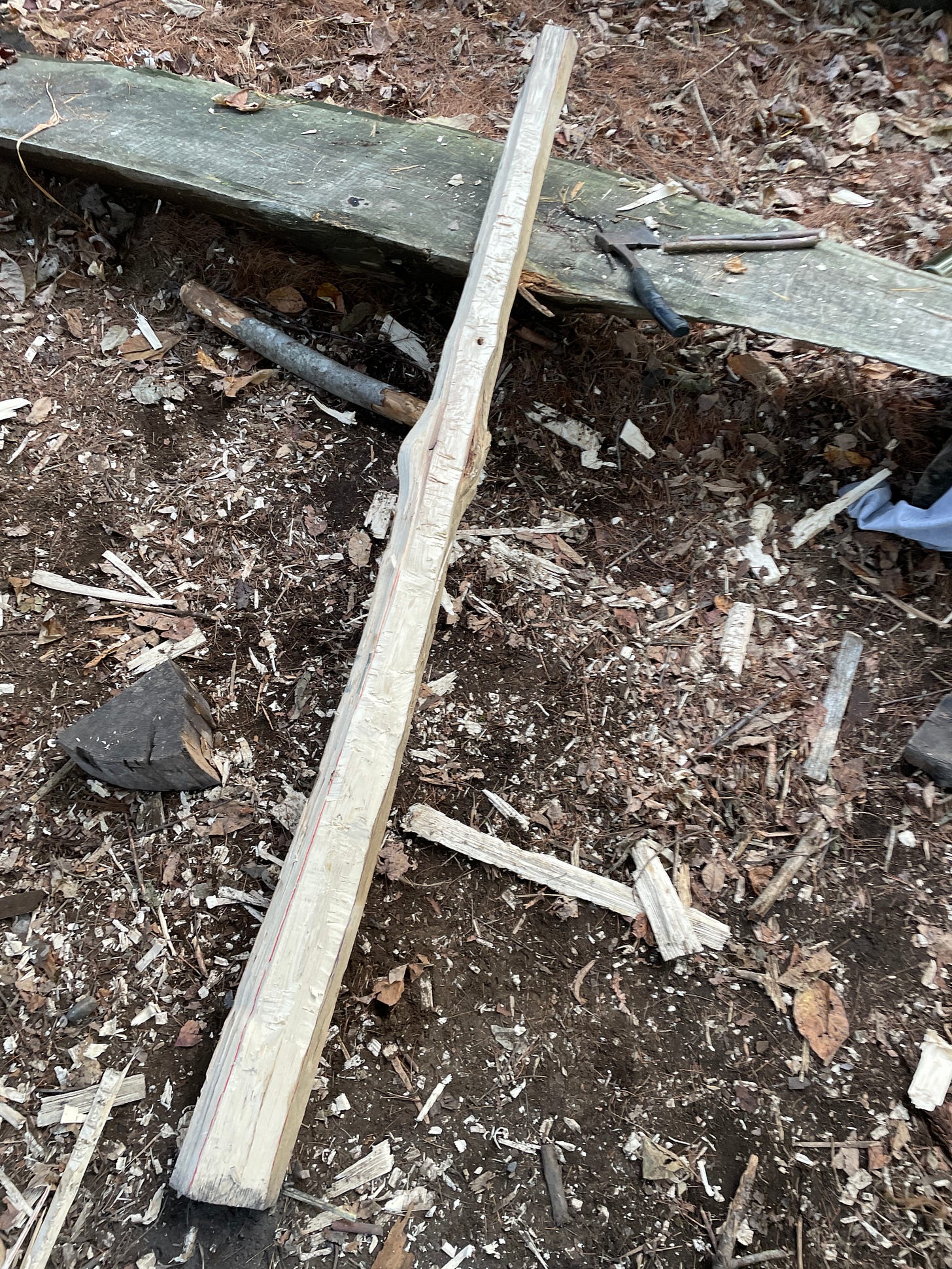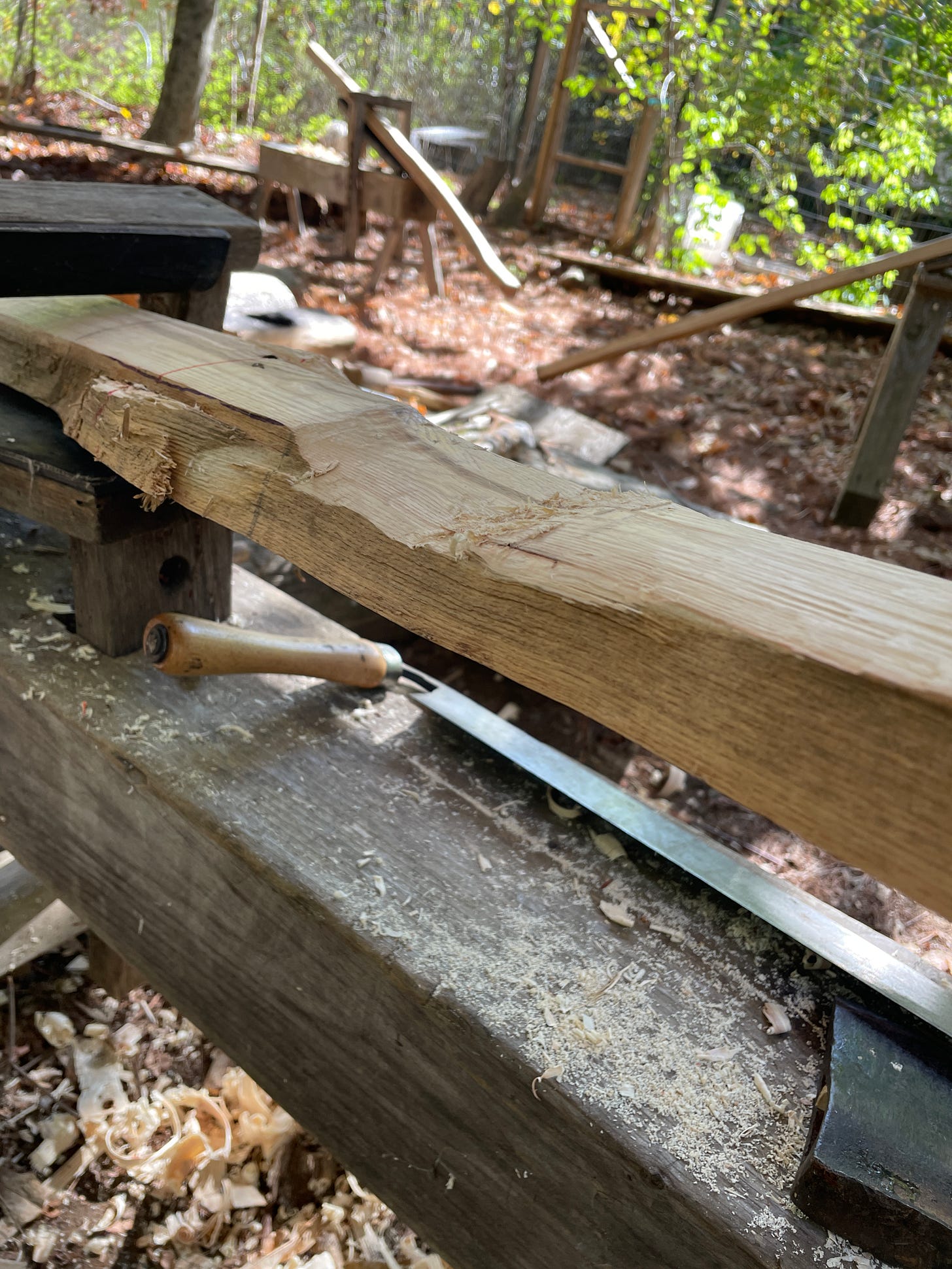Building a Bow: The Weight of Making Something Meant to Kill
This is the first part of a series exploring the sacred hunt and whether killing another living being can be an act of love and intimacy
I recently took a class at Maine Primitive learning to make a bow. Not the kind you tie in a ribbon. The kind that sends an arrow.
I came with a question I have been sitting with for a while now: Can killing be an act of love?
Let me be clear from the start. This is about food. About sustenance. About the most fundamental relationship humans have with the natural world. I am not talking about violence against humans or any other living being. I am not advocating for killing. I am exploring whether taking direct responsibility for ending the life that feeds me can be a deeper expression of connection and respect than the disconnected system most of us participate in.
“For you to live, every day something has to die.” One of my mentors and the founder of Maine Primitive Michael Douglas says this frequently. And it is true whether we think about it or not. Plants. Animals. Microorganisms. For us to sustain our life, we need light, energy, and the end of another living being.
Most of us in modern society are so far removed from that reality. There are so many people between us and our food. Layers of distance. Systems of disconnection. We are separated from the energy we put into our bodies to keep ourselves alive.
I think that disconnection is rooted in fear. At least it has been for me. Fear of death. Fear of my own participation in the cycle of life and death. Fear of the weight and responsibility of taking a life to sustain my own.
I have been primarily plant based for years. I have also eaten my fair share of meat over my life, and I still occasionally do. I eat hunted game. I eat seafood. I have taken the life of many fish and shellfish, and I try to do it in the most humane way I can.
I changed how I cook lobster after learning a more humane method. No more putting them directly in boiling water. Now I quickly take their life by putting a chef’s knife through their head and brain. It’s not easy. There’s a reaction after inserting the knife. Every time I do it there is both grief and gratitude. I thank the lobster for its life and the energy and sustenance it’s going to give me. And at the same time, I feel a sense of sadness for taking its life.
But that act, that moment of presence and gratitude, is what I am calling love. Not love as sentiment. Love as deep connection. Love as responsibility. Love as intimacy with the source of my survival.
I see the industrial food system as built on disconnection. On making sure we never have to see, never have to feel, never have to take responsibility for the death that sustains us. It protects us from discomfort at the cost of relationship.
What if the opposite is possible? What if choosing to be present to the full weight of taking a life for food is an expression of love? Not because killing is loving, but because presence, gratitude, and responsibility are.
That’s why I am on this journey toward the sacred hunt, where I develop a deep connection to the animal whose life and energy I will take to sustain my own.
Presence and Patience
Making a bow requires both presence and patience. Two things I view as critical components of coming from a place of love. And two things I definitely struggle with.
The process starts with a log. A tree that was cut a few years prior. It needs to age for a couple of years before you split it into quarters and try to get as many staves as you can from it.
I started with a quarter log of ash, a very hard wood, about six feet six inches long. I need a long bow given my height. Over the course of four days, I methodically and with a lot of patience slowly removed wood from that log.
I used a hatchet and a draw knife to slowly remove material and start to create the rough shape of the bow. This is a process that requires a tremendous amount of patience and presence. Removing too much wood can easily ruin and break the bow.
You get to the point where removing one growth ring can be the difference between a working bow or a broken one. It can mean removing ten pounds of force from it. When you make a bow, you need to make sure it has a minimum amount of force to humanely take the life of an animal. In Maine, to go deer hunting, you need thirty-seven pounds.
I found myself in a state of pure presence. I was not building something for today. I was not focused on finishing. I was not trying to be ahead of others or be the best. It was such a different space for me to be in. Because quite frankly, that is not always how I approach things. I often find myself comparing, competing, rushing to the end.
But here, methodically removing small amounts of wood, I experienced a tremendous amount of presence and patience. It felt grounding. Peaceful. Like I was exactly where I was supposed to be, doing exactly what I was supposed to be doing.
Building an Heirloom
As I was making the bow, I kept thinking about the fact that I was building an heirloom item. Something that can last for generations. This is not something that is going to last a few years. This can literally last for generations.
It was so much easier to put time, attention, love, and care into it with that understanding.
And at the same time, there was weight to what I was doing. What I was making was designed to take the life of another being. Something I do not particularly like to do.
I catch and release insects in our house. Really the only things I actively and willingly kill are mosquitoes and ticks, both of which spread a lot of disease.
I spent eight hours a day methodically removing a little bit of biomass at a time. Slowly shaping what was a log into the beginning of a bow. The whole time I was sitting with two kinds of weight.
The weight that what I am making is designed to take the life of another being. And the weight that what I am making is designed to last for generations.
It was amazing. But it was also complicated. Peaceful and heavy at the same time. Exciting and sobering. I was holding so many feelings at once, and somehow that felt right. Like I was supposed to be feeling all of it.
What Comes Next
My hope is that I will be able to finish my bow this calendar year. To be able to practice with it next spring and summer so that by next fall, I will be able to start hunting.
This is going to be a process. One of exploring whether killing my own food can be an act of love and intimacy. Moving toward the sacred hunt where I develop a deep relationship with the animal and understand its full being. Where I take full responsibility for the life that sustains mine.
This is about me choosing connection over disconnection. Presence over distance. Love over fear.
As I navigate this process, I am sitting with so many questions.
Is the life of an animal more important than that of a plant?
Will I be able to take the life of a mammal when the moment comes?
How will I respond emotionally?
Will I be able to honor the weight of it while still following through?
These questions feel heavy and important. I do not want to rush past them. I want to sit with the complexity of what it means to be a human who eats, who survives by taking life, and who wants to do that with as much presence, gratitude, and love as possible.
Making this bow with presence and patience feels like the right place to start.



Something to be said for getting really clear on where your energy comes from. I hear the invitation to be more intentional about our consumption choices in recognizing something else has died for us.
(And at minimum, a moment of deep gratitude before eating.)
I read a story of bowing to life. Your process of questioning and working hard to craft a bow for killing is a bow to life. I appreciate how you are slowing down your research process by taking an approach of hands on making with the earth in order to learn and reflect, on earth time, which path is right for you.